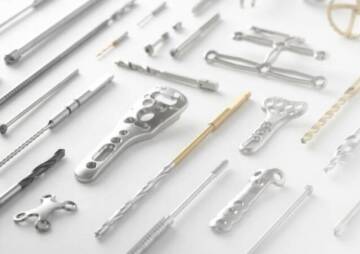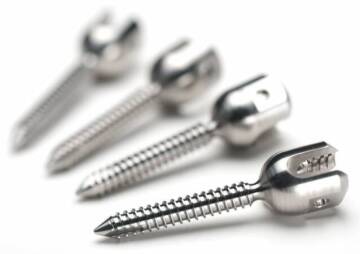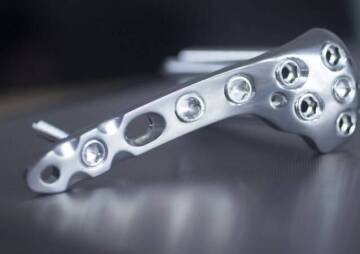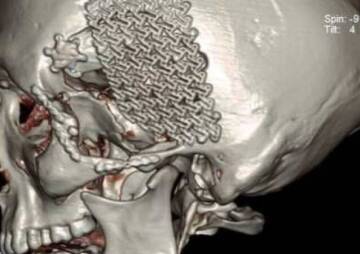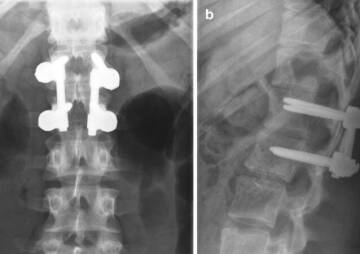-
Category
Craniomaxillofacial Surgery
Orthopedic Surgery
Spine Surgery
Orthopedic Implants
Hip Surgery
Knee Surgery
Pectus Excavatum
Bone Graft
Disinfectants
Healthcare
Which Is The Best Orthopedic Distributor In our country?
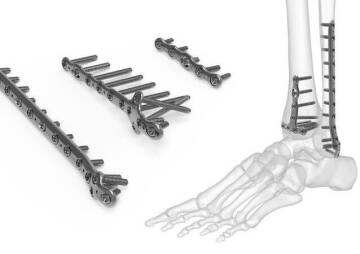
Orthopedic distributors with unique distribution strategies and channels sell reputable orthopedic equipment manufacturers to retailers or directly to surgeons Health News Center is also one of these reputable our country orthopedic distributors.
Today orthopedic conditions have forced orthopedic appliance manufacturers to work harder than ever before. So that in 2019, with a total trade of 64.6 billion dollars, the orthopedic device trade became the 44th most traded product in the world. Naturally, exports and imports of these products increased dramatically across countries. As a result, according to statistics, orthopedic product exports climbed from 61.4 billion dollars in 2018 to 64.6 billion dollars in 2019.
The demand for orthopedic appliances is increasing day by day. In today's highly competitive global marketplace, delivering products to Target consumers is the most important part of the orthopedic supplies trade. As you know, distributors, one of the four marketing mix elements, play a vital role in providing products to you. At Health News Center, as one of the most reliable orthopedic distributor companies, we want to offer our clients the highest quality products. Our mission is to provide clients with the highest possible long-term value by maximizing the potential of a competitive supply chain by implementing effective and efficient procedures and systems.
If you have decided to import orthopedic products, first of all, it is helpful to get complete information about the orthopedic distributor. This article is a good resource for this purpose.
What does A Distributor do?
This is one of the most sought-after questions you may be wondering the answer to. The marketing mix consists of four elements: product, price, distribution, and promotion. Distributors or intermediates are in charge of selling and delivering orthopedic products to target customers. Manufacturers prefer to collaborate with local distributors to market their products in different nations since they have complete control over the business culture and practices as well as the needs of that community. An orthopedic distribution company, such as Health News Center, acts as a manufacturer's representative and a direct point of contact channel between leads and manufacturers.
What Is The Distribution Process?
The distribution process may seem complicated at first, but for manufacturers, it is pretty straightforward. The product distribution process varies depending on factors such as product type, brand, the geographic scope of operations, manufacturer's vision, and the market served. There are three strategies for distributing products:
Selective Distribution
In this type of distribution strategy, the manufacturer selects a limited number of distributors in the target market to have more control over product sales. This type of distribution is suitable for products that must be informed before use, how to use, and after-use services. Electronics and medical devices such as orthopedic appliances are distributed to the target market in this way. For example, orthopedic implant manufacturers have chosen Health News Center to deliver their products to clients with more care and focus.
Intensive Distribution
This product distribution method is appropriate for businesses who want to sell their products to clients worldwide, from a small vendor to a big store. Basic supplies, cigarettes, snack foods, and soft drink beverages, as well as magazines, will be available to customers through this method of distribution.
Exclusive Distribution
This type of distribution is for luxury products and brands. The manufacturer authorizes only one distributor in a definite region to sell products in the exclusive distribution method. Famous brands such as Apple and Gucci use this distribution method to sell their products.
What Are The Types Of Distribution Channels?
Choosing a good and reliable distribution channel has always been a challenge for manufacturers. Because they have to choose a distribution company that significantly reduces marketing and advertising costs, communicates directly with potential customers, and ultimately sells more. If companies, large and small, do not have the right strategy to distribute and sell their products, their other marketing efforts will not be very effective. There are three types of distribution channels:
Direct Selling
In this manner, the company sells its products directly to its clients, without intermediaries and partnering with distribution organizations, as is now possible through e-commerce. Direct selling is the best distribution channel for SMEs so that they do not pay extra for other intermediary companies, transportation, etc.
Selling Through Distributors
This method is also called indirect selling. Manufacturers work with wholesalers and retailers to deliver products to target customers. For example, a reliable distribution company like Health News Center purchases high-quality orthopedic products from the manufacturer and offers them to orthopedic surgeons. Costumers will have no link with the manufacturer, so the credibility of the distribution company and the level of patients satisfaction with the products should be vital to them.
Dual Distribution
This is one of the marketing methods that some companies today use this strategy. They either sell their products through intermediaries or offer them directly to their customers through dedicated sales channels.
Why Do Companies Use Distributors?
I think you can answer that question. Assuming there is no orthopedic distribution company, how can you deliver quality products to surgeons? Could manufacturers export their products widely? Manufacturers need distribution companies to offer their products safely to leads. Otherwise, their sales would be either localized or limited to a few geographical areas. The distribution channel strategy pursues two goals. First, to deliver products and services to customers, and second, to provide a good user experience for customers. So companies work with distributors to sell more and to reduce their marketing costs.
What Companies Need Distributors?
There are many factories around the world today that are looking for a reliable distributor. Orthopedic equipment factories are on the rise, and they all need distribution companies to sell better and find their target customer. Of course, factories that need a distributor are not limited to orthopedic products. Companies that need a distributor to sell their products are more active in these areas:
- Automobile factories;
- Manufacturer of medical supplies and equipment;
- Scientific & Laboratory Instruments;
- Chemical factories;
- Consumer Electronics;
- Computer Hardware & Software companies;
- Brass Hardware & Components;
- Apparel & Fashion;
Of course, this list is not limited to these factories; many others require distributors to sell their products.
What Is A Good Distributor?
Manufacturers of orthopedic devices to increase their brand and products' credibility are always looking to work with well-known and robust orthopedic distribution companies. But what makes a distributor trustworthy?
- Understanding their market;
- Finding opportunities;
- Creating the right campaign strategy;
- Selling goods and services through websites or digital channels. For example, Health News Center offers orthopedic supplies to its customers through its website;
- Offering products to customers through tools such as social networks;
- Having marketing partners (such as advertising platforms) helps distributors reach more customers;
- Integrate some sales strategies.
What Are the Advantages of Having Distributors?
Orthopedic manufacturers choose an orthopedic distributor because:
- As an importer, you are a bridge between the international market and the manufacturer. This facilitates manufacturers' access to the global market and reduces logistics problems and trade risks for them.
- You are in charge of shipping and customs formalities, as well as other paperwork procedures. As a result, producers are relieved of this time-consuming duty.
- If an orthopedic distributor has a well-known reputation and target audience list for introducing a new brand to the market, it can sell products better than the manufacturer.; what Health News Center.
- A distribution company covers all expenditures associated with the product's promotion. As a result, the manufacturer's costs for this part are significantly lowered.
- A distributor will frequently extend credit to potential consumers.
A distributor plays a crucial role in developing a firm in a worldwide market with fierce competition for product sales.
What is an Authorized Distributor?
An authorized distributor is the dealer who has formally gained authorization to promote and sell products from a manufacturer or service provider. To become an authorized distributor, you must meet all criteria set by the manufacturer to gain the trust of your customers. These criteria are different for different companies and products. For instance, at Health News Center, we have met all the requirements provided by implant manufacturers that our customers can now easily trust us. You can also get a set of tutorials from the manufacturer for authorization.
What Is The Difference Between A Broker And A Distributor?
The vision of both distributor and broker is to help manufacturers easily sell their products to their target markets with minimal trading risks. But what is the difference between them? The distributor takes the products from the factories and stores them, then markets and sells them. In other words, the customer will have no connection with the manufacturer.
But brokers are a bridge between producers and buyers. They help manufacturers reach their target customers and sell their products to them. In other words, they do not stock any products and do not have sales authorization.
What Is The Difference Between A Wholesaler And A Distributor?
As mentioned in the beginning, as distributors, we work closely with manufacturers from whom we have received the formal authorization to sell and advertise products. Wholesalers purchase huge quantities of products from distributors and resell them to retailers. In fact, the manufacturer finds the distributor, and the distributor finds the wholesaler.
Who Is Bigger? Dealer Or Distributor?
This is one of the most frequently asked questions. Undoubtedly, with the explanations given earlier, you now know the answer to this question. The dealer is the bridge between the distributor and the target customer, while the distributor is the bridge between the manufacturer and the dealer. Distributors purchase products directly from manufacturers and resell them to a range of dealers. On the other hand, dealers buy products from distributors for their own account and trade them to the end-user.
Can A Manufacturer Be A Distributor?
Some manufacturers prefer to sell their products directly to retailers and customers rather than through intermediary companies. But it depends on the size of the business and the brand. Small and local manufacturers who do not have a target client outside their geographical borders can act as distributors or wholesalers themselves.
How Do Manufacturers Attract Distributors?
Business people believe that choosing a distributor is like a two-way street. This means that it is not only the producers who choose the distributors; the distributors also choose the producers. If you, as a distributor, want to select a manufacturer, you should consider four critical factors: Product Attractiveness, Company Attractiveness, Deal Attractiveness, and Systems Attractiveness. Having all of these aspects indicates that the manufacturer and its products are trustworthy and that you can cooperate with them. Otherwise, you can damage both your reputation and the brand of the manufacturer. So if you are an experienced distributor, be sure to choose a manufacturer carefully.
And The Last Word
If you are reading this article, you are probably an importer of orthopedic implants. Importing orthopedic products and selling them to the target audience who are orthopedic surgeons, is a growing and valuable business. Today, intermediaries or distributors who have a direct relationship with the manufacturers are doing this worthwhile business. Manufacturers of orthopedic products select reputable distributors to present and sell their products because the wrong distributor can lead to the manufacturer's business failing. If the distributor has all the criteria set by the manufacturer, it will be authorized to sell the products from the parent company.
Health News Center is a reputable in our country orthopedic distribution company with several years of experience cooperating with foreign manufacturers. In this company, we purchased the best and highest quality orthopedic equipment from foreign manufacturers and sold it to dealers and our target customers. Surgeons have been satisfied with all of Health News Center distribution Company's products, and they have praised us for providing up-to-date and high-quality supplies.


